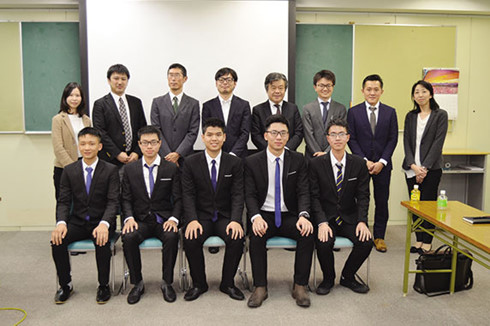Scholars begin Japanese course
To develop specialities in Vietnam’s workforce requires training in specialised skills.
 |
| Students will also engage with practical education, in the form of engagement with MHI |
Mitsubishi Heavy Industries Ltd. has just established a scholarship-based Japanese language programme in Japan for Vietnamese students, to promote capacity building in this way.
Students will start the programme by coming to Japan and studying Japanese. Under the terms of MHI’s agreement with MoET, MHI has developed a tailored Japanese language training programme. Each year, the programme calls for five students to study Japanese for 18 months, and, following this, seek to attend a Japanese university.
The first five students on this programme arrived in Japan earlier this month, and will begin their language training course at Sendagaya Japanese College in Tokyo.
The students are highly committed. One of them said, “Japanese has different grammar to Vietnamese, so it is not easy, but we will try our very hardest.”
Five years of skill building
University education is essential to cultivating comprehensive human resources.
In rapidly industrialising Vietnam, there is a strong demand for human resource capacity in industrial fields such as energy and infrastructure. The MHI Scholarship Programme is aimed at Vietnamese humanities and science students. Each year the programme will support five students, covering a total of 25 students over a period of five years.
MHI also plans to offer the students a chance to study its advanced technologies during their stay in Japan. The students expressed their hopes and ambitions for the programme. One said, “In addition to studying at the college, we hope to have opportunities for practical education, through activities such as interacting with MHI engineers who work at the forefront of technology, and factory internships.”
To date, MHI has contributed to human resource development in Vietnam by establishing endowed professorships in nuclear and aeronautical engineering at the Hanoi University of Science and Technology (HUST) and the Electric Power University, since 2009 and 2010. This latest scholarship programme offers enhanced content, collaboration with MoET, and a long-term commitment to human resource development. This is MHI’s first attempt to establish such a long-term educational programme.
The general manager of MHI’s Hanoi office, Kenichi Sonoda, said, “I am very happy to be able to send talented young Vietnamese students to Japan. They will doubtless encounter challenges when living away from their home country, but I’m confident that in the future they will act as a bridge between Vietnam and Japan.”
MHI Group: providing industrial solutions, from nuclear to space
MHI Group is a comprehensive equipment manufacturer and systems supplier, active in land, sea, air, and space technologies. The company has delivered infrastructure products to Vietnam in a wide range of fields, including thermal generation equipment, steelmaking machinery, and machining tools.
In the nuclear generation field, the ATMEA1 nuclear reactor – jointly developed by MHI and Areva, a French group specialising in nuclear power and renewable energies – has been proposed for a project in the south central province of Ninh Thuan.

